Teodor Reljic's Blog, page 17
March 5, 2015
Monster March | Kill List

Murder-bound: Neil Maskell and Michael Smiley in Kill List (2011)
While Schlock Magazine gets its ‘Monster March’ on the road, I troop away with my own, this time with a cold, hard aspiring cult classic.
Was it Harold Bloom who said that a ‘strong’ new literary entry has the power to alter even its predecessors in some way? Not name-dropping a theorist to up my cultural capital, and neither can I say I fully understand the above assertion, but it popped into my head as I finally watched Ben Wheatley’s Kill List (2011). The reason it popped into my head is because I couldn’t help but compare it to a later – and American – iteration of the same themes and character dynamics: the first season of HBO’s True Detective (2013). Seen this way it’s certainly a haunting matrix of fears and anxieties. As in True Detective, you’ve got fraught male bonding – scarred and identified by both traumatic history and a looming mid-life crisis. And spoiler alert here, but both properties also deal with filmed horrific acts distributed through underground networks, informed and capped off by a mass boogeyman in cult form.

American Gothic: Matthew McConaughey and Woody Harrelson in True Detective
The British variant of said cult is culled from the pagan imagery of homegrown classic The Wicker Man (1973), where True Detective clearly takes a cue from sadly enduring but eminently exploitable Ku Klux Clan imagery. If their similarities are thematic, their differences are narrative and stylistic. A common complaint with True Detective was that it got bloated and keeled over towards the end: the suspense and occult intrigue proved to be a game of hurried smoke and mirrors on the part of the – inexperienced – writer and showrunner Nic Pizzolato’s part. Of course, being a lean feature film, Kill List doesn’t have that to worry about, but it’s also a crueler beast. There is no sentimental arc for either of its protagonists to fall back on, and its grisly denouement leaves no window open for the mismatched happy ending afforded to True Detective.

Prelude to a Burning: Christopher Lee as Lord Summerisle in The Wicker Man (1973)
“You’re cogs,” the protagonists of Kill List are informed at one point. The cults at the centre of both Kill List and True Detective are a grotesque reminder of how an attempt at heroism and exceptionalism can be undermined by this persistent aspect of the human psyche. Monsters are at their worst when they get organised.
READ PREVIOUS: Frankenstein’s Army

March 2, 2015
Monster March | Frankenstein’s Army
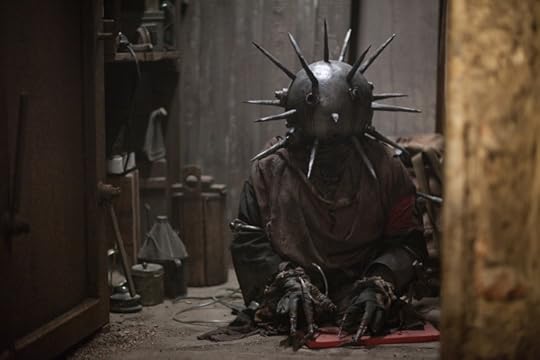
No agency: The patchwork creations of Frankenstein’s Army are a perverted steampunk fever dream
While Schlock Magazine gets its ‘Monster March’ on the road, I troop away with my own, starting with a shit-and-mud caked gem.
That there is something both liberating and enslaving about the monster is a well-worn trope in both popular culture and popular discussion. ‘You take something away, you get something back’ is part of it: monstrosity can signify exclusion and enslavement, but by that same token it can also mean that the monster is freed from the rat race of day-to-day existence. By destiny or design, the monster is plunged into a skewed world, which can yield to plenty of advantages if they play their cards right… that is, given that the monsters in question have any cards to play at all, or if they do, whether they have the cerebral capability to process the rules of the game in question.
The monsters of Frankenstein’s Army (2013) certainly have zero agency. Nazi cyborg grunts for the titular Josef-Mengele like throwback to Mary Shelley’s famous doctor, they shuffle along, showing off their freshly grafted bodily modifications with automated – but still menacing – glee. What’s more interesting though is Dr Frankenstein’s (Karel Roden) justification for his experiments… at least, the justification we’re given at the end, which feels like a hurried, tacked-on thematic appendage suited both to his in-film creations and the meta-film’s messy raison d’etre.
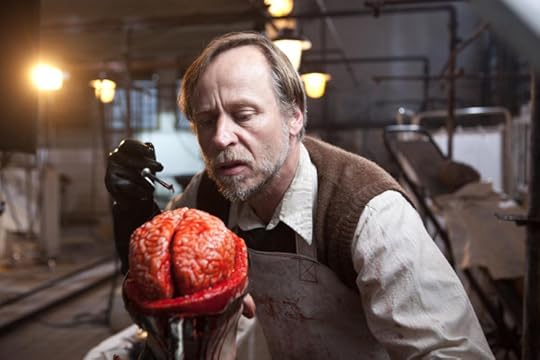
Frankenstein, you’re barmy: Karel Roden as the titular mad scientist
The fascists he – ostensibly – works for and under are “insane”, Frankenstein admits. But so are communists and capitalists. he declares. His creations, on the other hand, made entirely of the human contradictions that lead to war, can in fact be used to smooth the same contradictions out. The scene in which the doctor attempts to collage a fascist brain with a communist one is an explicit illustration of this, of course, but it’s also a reminder of how vulgar pulp can remind us of what monsters are ‘for’ in the first place.

February 15, 2015
Red Right Hand | Hellboy & Crimson Peak
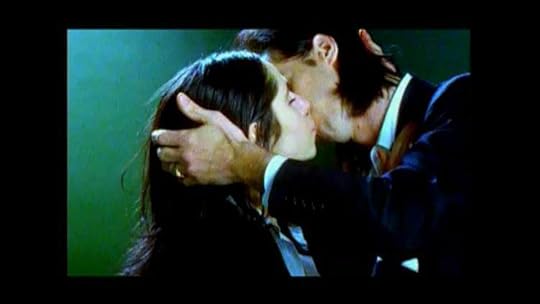
Nick Cave and PJ Harvey in the video for Henry Lee (1996)
Not quite a case of cover versions I prefer to the original, but the recent trailer for Guillermo Del Toro‘s upcoming Crimson Peak (yay!) showed us how Nick Cave’s haunting ditty Red Right Hand is etching itself into the Mexican director’s oeuvre as a musical placeholder, albeit as ventriloquised by different musicians.
A version by Pete Yorn was heard in the original Hellboy (2004), also directed by Del Toro. Something of a logical choice given the subject matter, even if the connection is a shallow one (i.e., limited to the song’s title). Yorn’s jauntier version certainly strips the song of its atmospheric sense of foreboding. Which is just as well in this case, because even though Hellboy – and Del Toro’s films in general – may have its creepy gothic touches, it remains a quirky superhero romp at the end of the day.
PJ Harvey’s version, originally commissioned for another audio visual project – this time the British gangster TV series Peaky Blinders – feels right for gothic melodrama Crimson Peak, at least insofar as the trailer suggests. Harvey’s pained vocals offer a nice contrast to Cave’s hard, stark imagery.
It’s a dynamic that matches my expectations of Crimson Peak itself. It appears to be a ghost story of the Victorian variety and as such, one that would by definition rely on subtle scares, rather than the outre, primary-coloured flourishes Del Toro is known for, and which he doesn’t appear to be shying away from here. I anxiously await to see how the twain will meet – if it does at all – come October.

February 12, 2015
Better the tropes you know | Gotham, The Musketeers and Black Sails
The premiere of Better Call Saul got me thinking about how the shows I enjoy now, post Breaking Bad folding, tend to fit more easily into the mold of romance rather than realism, and that this probably has a lot to do with how the ruse has now been rumbled on the supposedly ‘bold’ grittiness of the shows that have been lauded with both praise and generous ratings over the past few years.
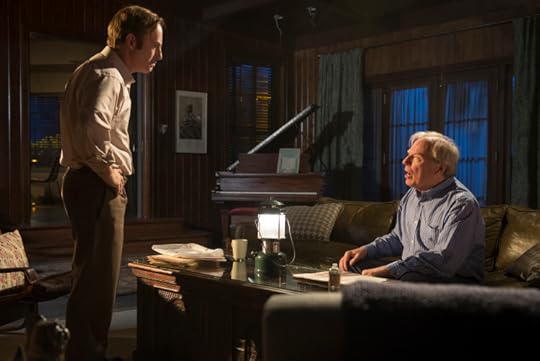
“Have you grounded yourself?” Better Call Saul is off to a strong start
You know, shows like The Wire and, indeed, Breaking Bad itself, with the latter admittedly conceding to a few Tarantinoesque stylistic flourishes every now and then.
This article illustrates the point better than I ever could, but the point remains this: there’s very little actual innovation or subversion happening in these shows, and this kind of storytelling is always better when its embraces its ‘genre’ roots. Because straining to do otherwise often results in nothing but kitsch. I enjoyed Breaking Bad and The Wire as much as anyone, but shows like Boardwalk Empire felt like brittle attempts at the same: spread thin by the half-assed attempt at historically accurate drama, it felt neither here nor there.

Ben McKenzie as James Gordon and Robin Lord Taylor as Oswald ‘Penguin’ Cobblepot in Gotham
These days I’m quaffing shows like Black Sails, The Musketeers and Gotham – they don’t bother to hide their roots in firmly trodden narrative ground, and any ‘grit’ is by-the-by, acknowledged as just another stylistic detail rather than a willful attempt at – ultimately hollow – innovation. Hell, they simply can’t hide their derivative nature: all three shows are explicitly sourced from clear antecedents. Black Sails is a very loose prequel to Robert Louis Stevenson’s Treasure Island with a liberal sprinkling of ‘historical’ pirates thrown into the mix, The Musketeers is yet another adaptation of Alexandre Dumas’ enduring piece of swashbuckling proto-pulp fiction, and Gotham is a shamelessly opportunistic but also refreshingly goofy series about Gotham City 20-odd years before Batman arrived on the scene.
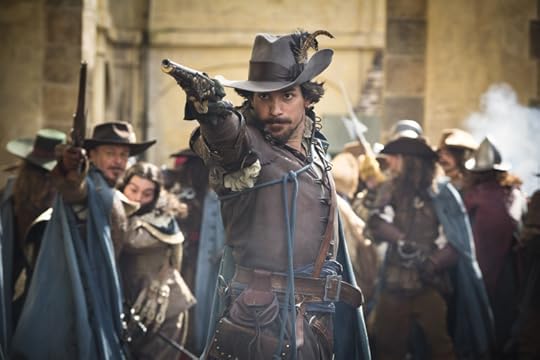
Santiago Cabrera as Aramis in The Musketeers
It’s particularly telling that the first two shows in are sourced from Stevenson and Dumas, writers historically associated with the aesthetic of ‘romance’. The BBC’s own Musketeers may not be the best iteration of that story – and it’s certainly the weakest show of this particular triad – but it’s telling that it reared its head just now, as if in direct opposition to the prevailing trend. Black Sails may have the same levels of sex and violence you’d expect from the likes of Game of Thrones*, but its main MO is adventure and intrigue, not some half-baked exploration of moral ambiguity. And while Gotham, being a prequel to an established comic book property, appears to play in the same sandbox as most of the reboot-and-remake happy mainstream, it resists the urge to ‘grimdark’, giving us a Gotham Cityscape that is less Nolan, more Burton.

Jon Hamm as Don Draper in Mad Men
This is of course not to say that I won’t be tuning into Breaking Bad spinoff Better Call Saul – the pilot of which I found terrific – nor that television can’t be anything except pulp. But I’m finding more pleasure in taking in this kind of genre fare at the moment. Mostly because the likes of Breaking Bad, The Sopranos, Mad Men et al have proven themselves to ultimately be all about dissatisfied and/or stifled macho men eager to live out their machismo, and largely succeeding in doing so. There’s very little about that I find profound, and the fact that we’re treating it as something novel and worthy of our time all on its own is a bit disconcerting.
I would rather have my macho men as flat archetypes, to be taken with a pinch of salt. Better than than being lured into contemplating their aggressive contours as something to take in fully and even – the implication being – to be emulated.
*Game of Thrones is an interesting exception that proves the rule: by presenting us with a fantasy world that is directly informed by episodes from ‘real life’ medieval history, it blends both realism and romance.
READ RELATED: We Need to Talk About Genre

February 4, 2015
Greeking

Alexis Tsipras, leader of the Greek left-wing party Syriza, was elected Prime Minister of Greece on January 25 (Photo: AFP/Getty)
“The light disdain of the Greeks, which I have never ceased to feel under their most ardent homage, did not offend me; I found it natural. Whatever virtues may have distinguished me from them, I knew that I should always be less subtle than an Aegean sailor, less wise than an herb vendor of the Agora. I accepted without irritation the slightly haughty condescension of that proud race, according to an entire nation of privileges which I have always so readily conceded to those I loved. But to give the Greeks time to continue and perfect their work some centuries of peace were needed, with those calm leisures and discreet liberties which peace allows. Greece was depending upon us to be her protector, since after all we say that we are her master. I promised myself to stand watch over the defenceless god.” – Marguerite Yourcenar
*

February 1, 2015
Nevermind the Oscars: Here’s Adam Wingard

Dan Stevens in The Guest
The Oscar race is underway, with its depressing churn of predictable bland shoo-ins like The Imitation Game and The Theory of Everything, coupled with the politically vile (not that the Academy cares) American Sniper and the scattershot and smug mess that is Birdman. I don’t hate all of the top contenders, exactly: Boyhood and The Grand Budapest Hotel are works of singular artistic vision – if they are nothing else, they’re that – and Whiplash is a fun monster thriller masquerading as a musical künstlerroman.
But out of all the films I’ve watched during the holiday season and just about beyond, it’s not decorated ‘art dramas’ – to use Noam Chomsky’s charming descriptor for middlebrow awards-bait – that made me stand to attention. That honour goes to the workmanlike talents of Adam Wingard, whose You’re Next (2011) and The Guest (2014) captured my imagination and made me feel like a kid again.
My good friend Krista Bonello Rutter Giappone described the former film as an adult version of Home Alone in a lot of ways, and taken on those terms, Wingard’s high-concept but low-budget home invasion thriller works a treat. Extra geek points for casting fellow indie directors and , along with a matronly role from the formerly oft-naked , who furnished many a young boy’s burgeoning sexual fantasies in the cult splatter fests envisioned by (and often based on the works of HP Lovecraft). But the film thankfully doesn’t waste too much screen time on geeky winking and nudging, instead getting on with the violent and inventive-prop-heavy job at hand with brutal gusto and a healthy dose of black humour. There’s no excuses made for the moral implausibility of its central premise (and twist), nor for the explained-away survival skills of its Australian protagonist, Erin (Sharni Vinson), and that’s fine. You’re Next belongs to neither of the flogged-horses of contemporary horror – torture porn and found footage – and it gets extra points for me on that basis alone.
The Guest is similarly un-trendy in its evocation of meaty genre thrills of yore: this time the action thrillers of the 70s and 80s, albeit with a Drive-like sonic wash courtesy of an evocative ear-worm of an electro soundtrack. Its narrative anatomy appears to suggest a military thriller brimming beneath the (suburban) surface. But as the John Carpenter-esque opening credits font suggests: we’re entering into Halloween territory, and if this weren’t clear enough already, the film is set during Halloween too. But again, the references don’t call attention to themselves, and Wingard commits to his material and his influences to craft something that’s a direct descendant of a lineage – pulpy as it may be – and not a threadbare imitation with references stapled on. What this means is that we look forward to every lurid twist and payoff, and that Wingard delivers it. Dan Stevens, formerly of Downton Abbey, also ‘gets’ what the project is all about: it’s a loving tribute, not a cynically knowing one.
Although it garnered a generous clutch of positive reviews, The Guest fared abysmally at the American box office. But that’s to be expected, really. Wingard’s films have been hatched into a cinematic atmosphere that favours either young-adult reboots and/or superhero epics on the one hand, and hyped-to-death awards bait on the other – the latter of which ends up being more about the viability of their stars than the story they occupy.
But I think Wingard’s films remain important aberrations in the scene. Freed from the insipid and facile ‘irony’ of most latter-day B-movies, but possessing a canny intelligence that helps them rise above morass, they are primordial and fully pleasurable experiences. Like the splatter-heavy but vivacious early short stories of Clive Barker, they eschew subtlety and good taste to tap into the childish – not childlike – anarchic side. Sure, this ain’t – but at least it’s something akin to Gremlins.
And Hollywood needs a similar injection of crazy, stat. It needs wilder dreams. Sleep of reason produces monsters, and all that…

January 28, 2015
Sailing
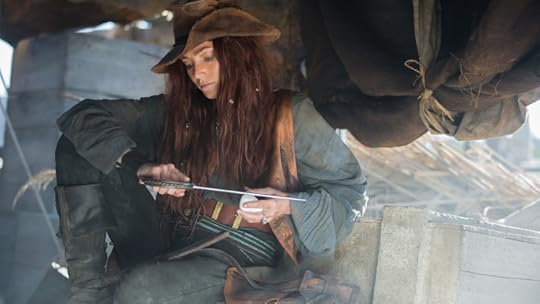
Clara Paget as Anne Bonny in Black Sails
“Any mention of pirates of the fair sex runs the immediate risk of awakening painful memories of the neighbourhood production of some faded musical comedy, with its chorus line of obvious housewives posing as pirates and hoofing it on a briny deep of unmistakable cardboard. Nonetheless, lady pirates there have been – women skilled in the handling of ships, in the captaincy of brutish crews, and in the pursuit and plunder of sea-going vessels.” – Jorge Luis Borges
*

November 27, 2014
We Need to Talk About Genre | Individuality vs Community
Argument: We divide fiction up in genres because of our chronic fear of loneliness.
I’m invested in this question, which is evidenced by my foolhardy effort to write a parallel-narrative novella incorporating both the fairy tale idiom and the very ‘real’ world, as well as my attempt at getting at what that multi-faceted mongrel genre ‘the New Weird’ is all about for a Master’s dissertation.
But first, some (recent) observations on the matter from more articulate and well-versed people than myself.
*
Ursula K. Le Guin’s speech at this year’s National Book Awards
“I rejoice at accepting [the award] for, and sharing it with, all the writers who were excluded from literature for so long, my fellow authors of fantasy and science fiction—writers of the imagination, who for the last 50 years watched the beautiful rewards go to the so-called realists.
“I think hard times are coming when we will be wanting the voices of writers who can see alternatives to how we live now and can see through our fear-stricken society and its obsessive technologies to other ways of being, and even imagine some real grounds for hope. We will need writers who can remember freedom. Poets, visionaries—the realists of a larger reality.”
‘A Better Way to Think About Genre’ by Joshua Rothman (New Yorker)
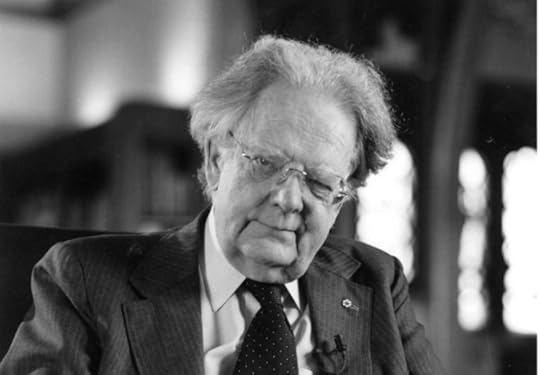
Northrop Frye
“It’s tempting to think that we might do without these kinds of distinctions altogether. Why not just let books be books? The thing is that genre doesn’t have to be vexing. It can be illuminating. It can be useful for writers and readers to think in terms of groups and traditions. And a good genre system—a system that really fits reality—can help us see the traditions in which we’re already, unconsciously, immersed. As it happens, there is such a system: it was invented by the Canadian literary critic Northrop Frye, and laid out in his 1957 masterwork, Anatomy of Criticism.”
The Real Mr. Difficult, or Why Cthulhu Threatens to Destroy the Canon, Self-Interested Literary Essayists, and the Universe Itself. Finally. by Nick Mamatas (Los Angeles Review of Books)

A young HP Lovecraft
“Lovecraft’s quality is obscured by his difficulty, and his difficulty is obscured by his popularity. If Lovecraft isn’t seen as a difficult writer, it is because of the pulp idiom in which he worked. [Jonathan] Franzen points to college as the place where people are made to read difficult books, but Lovecraft is an adolescent fascination. Lovecraft demands the careful attention that only a teen boy with little else to do – no high school romances, no sports practice – can muster. Lovecraft’s pulp provenance, and early spike by Edmund Wilson, kept Lovecraft’s work from being taken seriously. Only over the past twenty years, with reprint volumes via Penguin Classics and Library of America, with champions such as Michel Houellebecq and Reza Negarestani has Lovecraft earned a place in what we used to call the canon (while making quotation marks in the air with our fingers, notch).”
*
These are all problems that have been burning at my brain in some form of another for as long as I can remember (slight exaggeration, but it certainly feels that way). Because I take this very seriously for whatever reason – friends and family who know me intimately can feel free to psychoanalyze away – I’m driven to find an evolutionary root to our need to divide up literature into genres, and then argue about it endlessly.
Cards on the table: if I’m a follower of any critical school on this front at all, I’m a follower of Frye’s. His organic view of genre both suits my needs as a writer and provides me with an inclusive argument about genre that, ostensibly, short-circuits going-nowhere binary arguments on the issue. Also, there’s a pervasive paradox in the way I process this whole thing: I hate the idea of genre as segregation, but I don’t want us to do away with recognizing genres, because there’s an aesthetic pleasure in picking out what belongs to which tradition.
That Edgar Allan Poe influenced Lovecraft who in turn influenced Ridley Scott and Stuart Gordon and Caitlin R. Kiernan and Nick Mamatas and Cradle of Filth and countless others, and that the details stolen from Lovecraft by each of these artists are traceable to Lovecraft but still distinct, and that this intertextual richness evokes a kind of hopeful reminder of the prodigious human imagination, as it stretches across generations.
But on a more universal note, I will suggest that genre stems from a combined need for both INDIVIDUALITY and COMMUNITY. In this pantomime debate between the ‘literary mainstream’ and the ‘genre community’, the literary side is ‘clubby’ in the original sense of the word: the domain of an elite that gatekeeps itself into a privileged minority, with all the attendant ‘real world’ social implications of that.
While the ‘genre’ community, on the other hand, is seen as a regressive ‘cult’ circle that turns its back on the ‘real world’ in favour of a vacuum-sealed aesthetic that often favours the tried and tested over any attempts at current social commentary or formal innovation (perhaps the Pre-Raphaelite Brotherhood is an iconic example).
But this perception – the pantomime is very much a perception – is made doubly complicated by the fact that we’re discussing works of art here. Leaving aside value judgements of the individual works of art in question, the reason why the genre debate will never settle into a peaceful resolution is because we’re asking the works of individuals to answer to the needs of a community, however large and nebulous this community may be.
There will always be mavericks, trailblazers, and ‘exceptions to the rule’. But even declaring that the mavericks are all that you like places you in a double bind: each maverick will have their influences, and in each influence – much like Lovecraft’s fish-god mongrels from Innsmouth – lies a genetic code that can’t be denied, and which ties back to a tradition.
Traditions are what genre is built on, and tradition will be something not even the most opaque of ‘literary’ fiction would be able to deny… strain as it might for originality and freedom from market constraints and critical labels.
We all want to be ourselves, but none of us want to be lonely.
READ RELATED: Getting it Ass-Backwards: The Genre Binary at LonCon

November 25, 2014
‘Writing is too much fun’ | Jim Crace

Jim Crace at a press conference at the University of Malta earlier this month. Crace will be Writer in Residence there until December 19
My interview with novelist Jim Crace was picked up by the Man Booker Prize’s website this week. The acclaimed British author is currently holding court at the University of Malta – my alma mater – where he will be stationed as Writer in Residence and erstwhile mentor to local authors until December 19.
I’m very excited to form part of the intimate gathering of Malta-based writers who’ll be receiving advice and encouragement from Crace in the coming weeks. Initial meetings have certainly been morale-boosters. For a decorated novelist with a long and illustrious career behind him, Crace is as unassuming as they come, and it’s also refreshing to see him express a genuine interest in Malta, contrary to the tokenistic praise – delivered in press-friendly soundbites – by other celebrity visitors.
Here is what the Man Booker people had to say about all this:
Jim Crace, twice a Man Booker shortlistee, has been talking in Malta, where he is currently writer in residence at the university of Malta, about why he reversed his decision not to write another novel, and he credits, in part, the Man Booker itself. ‘I honestly wasn’t expecting to get shortlisted for the Man Booker again,’ he said about his 2013 shortlisting for Harvest. ‘Really, I thought that I was coming to the tail end of my career and just writing books for myself, essentially … but then along comes Harvest … and my career just bounced back again. Suddenly, what was gradually quieting down was even noisier than it ever was.’ This is good news for his legion of admirers. It is good to know that the prize can, while it can’t cure flu or the ageing process, nevertheless can have such a curative effect. Crace admitted another motivation too: ‘Ultimately the real reason why I returned to writing was simple: it’s just too much fun not to do it.’
Click here to read the full piece
Click here to read my interview with Jim Crace

November 18, 2014
What We Do In Shadows | The Internet and Optimism

Reading revolution: Let’s opt for long-form articles over listsicles
The churn of world news as fuelled by social media is the ultimate form of contemporary escapism. All the more so because it’s insidious: you think you’re engaging with the world at large by posting a link to the latest piece of news hysteria (with an accompanying slice of commentary of your own) but what’s really happening is that you’re simply enabling a vicious cycle to keep spinning.
Vacuous listsicles are part of the problem, yes, but the real threat, I think, are polemical think-pieces such as this one. All they enable are hearty rants – an automatic indignation that fizzles out soon enough, to be replaced by the next carefully-curated injustice to appear on our screens.
The virtual podium of social media has made us believe that we’re at the centre of things – even if we’re decrying just how marginalized we’ve become – by dint of any number of factors that the net savvy global media is more than happy to provide us – we’re doing it from a position that makes us believe we have all the ears in the room standing to attention.
This is wrong, and the main reason is wrong is not for any intrinsic arguments it may be able to make. Far be it from me to decry anyone to take a critical stance on anything. The Guardian article makes some great points about the contemporary media landscape, and we would do well to be wary about how the media conglomerates are manipulating our increasingly more pervasive digital space.
But it also appears to prioritize feeling helpless over seeking out any creative solution. Nevermind the fact that, despite the mainstream infiltration of commercial interests into the digital realm, nothing is stopping us from finding our own way around the maze, and searching for things that are enriching and worthwhile.
Russell Brand’s calls to ‘revolution’ may be one of the most trendily misguided phenomena to emerge in popular culture over the past year – though criticism of it has also tended towards the unhelpfully glum.
So I propose a more modest revolution. The revolution of reading long-form articles as opposed to listsicles as a direct affront to what the contemporary digital zeitgeist expects us to do, apparently.
*
Partly as an affront to the above-linked Guardian article in particular and partly as an affront to this suffocating zeitgeist in general, I’m aiming to counter all this with a bloody-minded optimism, and a belief that social media is not an endgame but a distracting detail.
I won’t deactivate my Facebook account because that’s plainly a desperate act, and neither will I resort to bashing the internet, because the internet is not a monolithic whole. But I will do my best to remember that it’s the stuff we do quietly, in the margins, that really matters.
Make something, do something, then show it on Facebook if you feel like it. I don’t want to bash ‘exhibitionism’ either: after all, if you want other people’s opinions on something you should be able to try and get them.
‘What we do in shadows’ could be a good motto.
More than anything though, it’s the overtones of helplessness, which only seem to be encouraged by all that I’ve just described, that I want to do away with. If something doesn’t energize you in any positive (in the sense of constructive) way, then discard it. And this includes righteous anger, by the way, just not the kind of righteous anger that leaves you running in place.
*
Optimism is both uncool and hard, but more and more I feel it’s the only option I’ve got left.





